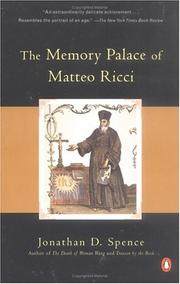| Listing 1 - 4 of 4 |
Sort by
|

ISBN: 0140080988 Year: 1985 Publisher: New York Penguin
Abstract | Keywords | Export | Availability | Bookmark
 Loading...
Loading...Choose an application
- Reference Manager
- EndNote
- RefWorks (Direct export to RefWorks)
Missionaries --- Biography --- Ricci, Matteo, --- Societas Jesu --- Missions --- China --- History
Book
ISBN: 9781442205864 9781442205888 1442205881 1283051559 9781283051552 1442205865 9786613051554 6613051551 Year: 2011 Publisher: Lanham, Md. Rowman & Littlefield
Abstract | Keywords | Export | Availability | Bookmark
 Loading...
Loading...Choose an application
- Reference Manager
- EndNote
- RefWorks (Direct export to RefWorks)
#GBIB: jesuitica --- 271.5 <51> --- 929 RICCI, MATTEO --- 271.5 <51> Jezuïeten--China --- Jezuïeten--China --- 929 RICCI, MATTEO Biografie. Genealogie. Heraldiek--RICCI, MATTEO --- Biografie. Genealogie. Heraldiek--RICCI, MATTEO --- Ricci, Matteo, --- Ricci, Matteo --- Li, Ma-tou --- Li-ma-tou --- Li, Madou --- Limadou --- Ri, Matō --- Ricci, Matthieu --- Richchi, Matteo --- Rīchī, Mātiʼū --- Rīchī, Mātiyū --- Ritchi, Mateo --- Риччи, Маттео --- (ماتىو رىچى --- 利瑪竇 --- 利玛窦 --- Societas Jesu --- Compagnie de Jésus --- Compañia de Jesus --- Gesellschaft Jesu --- Jesuitas --- Jesuiten --- Jesuiti --- Jesuits --- Jezuïten --- Jésuites --- Paters Jezuïten --- Societeit van Jezus --- Society of Jesus --- イエズス会 --- カトリック イエズス会 --- China --- History --- History.
Book
ISBN: 9781003490159 1003490158 1040093310 Year: 2024 Publisher: Oxford : Taylor & Francis Group,
Abstract | Keywords | Export | Availability | Bookmark
 Loading...
Loading...Choose an application
- Reference Manager
- EndNote
- RefWorks (Direct export to RefWorks)
This is a systematic study of Matteo Ricci's (1552-1610) enormous impact on the development of modern scientific and intellectual terminology in China.
Chinese language --- Religion --- Astronomy --- Geometry --- Missions --- Etymology. --- Semantics, Historical. --- New words. --- Foreign elements. --- History --- Terminology --- History. --- Linguistic work --- Ricci, Matteo,
Book
ISBN: 9781421406060 1421406063 1421407124 9781421407128 Year: 2013 Publisher: Baltimore : Johns Hopkins University Press,
Abstract | Keywords | Export | Availability | Bookmark
 Loading...
Loading...Choose an application
- Reference Manager
- EndNote
- RefWorks (Direct export to RefWorks)
"Accounts of the seventeenth-century Jesuit Mission to China have often celebrated it as the great encounter of two civilizations. The Jesuits portrayed themselves as wise men from the West who used mathematics and science in service of their mission. Chinese literati-official Xu Guangqi (1562-1633), who collaborated with the Italian Jesuit Matteo Ricci (1552-1610) to translate Euclid's Elements into Chinese, reportedly recognized the superiority of Western mathematics and science and converted to Christianity. Most narratives relegate Xu and the Chinese to subsidiary roles as the Jesuits' translators, followers, and converts. Imagined Civilizations tells the story from the Chinese point of view. Using Chinese primary sources, Roger Hart focuses in particular on Xu, who was in a position of considerable power over Ricci. The result is a perspective startlingly different from that found in previous studies. Hart analyzes Chinese mathematical treatises of the period, revealing that Xu and his collaborators could not have believed their declaration of the superiority of Western mathematics. Imagined Civilizations explains how Xu's West served as a crucial resource. While the Jesuits claimed Xu as a convert, he presented the Jesuits as men from afar who had traveled from the West to China to serve the emperor."--Publisher's website.
Ricci, Matteo, --- Jesuits --- Missions --- History --- China --- Religion --- Social conditions --- S02/0310 --- S02/0200 --- S13B/0429 --- China: General works--Intercultural dialogue --- China: General works--Civilization and culture --- China: Christianity--Missionary works and activities of the Catholic Church general and until 1840 --- Ricci, Matteo --- Li, Ma-tou --- Li-ma-tou --- Li, Madou --- Limadou --- Ri, Matō --- Ricci, Matthieu --- Richchi, Matteo --- Rīchī, Mātiʼū --- Rīchī, Mātiyū --- Ritchi, Mateo --- Риччи, Маттео --- (ماتىو رىچى --- 利瑪竇 --- 利玛窦 --- Compagnie de Jésus --- Compañia de Jesus --- Gesellschaft Jesu --- Jesuitas --- Jesuiten --- Jesuiti --- Jezuïten --- Jésuites --- Paters Jezuïten --- Societeit van Jezus --- Society of Jesus --- イエズス会 --- カトリック イエズス会 --- History. --- Civilization.
| Listing 1 - 4 of 4 |
Sort by
|

 Search
Search Feedback
Feedback About UniCat
About UniCat  Help
Help News
News